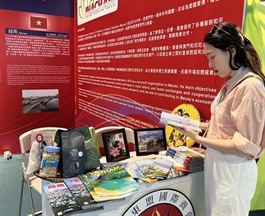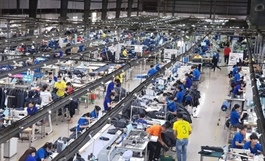Vietnam should keep close watch on inflation rate: World Bank
Vietnam should keep close watch on inflation rate: World Bank
Vietnam should closely monitor inflation which has been on the rise in recent time, according to the World Bank (WB).

Vietnam should closely monitor inflation which has been on the rise in recent time, according to the World Bank (WB).
In its “Vietnam Macro Monitoring” report in September, the WB said the consumer price index (CPI) grew from 3 per cent in August to 3.7 per cent in September, continuing a sharp upward trend that started in June.
Inflation was due to higher prices of food and foodstuffs as well as housing and construction materials. Additionally, the price of transport services contributed 0.3 percentage point to CPI inflation due to the new round of oil price increases registered during July-September this year.
In stark contrast, core inflation which excludes food, fuels and government administered prices, continued to soften from 4 per cent in August to 3.8 per cent in September.
Vietnam’s economy picked up in Q3 thanks to a gradual recovery of the exports, however, domestic consumption remained subdued and credit growth continued to be slow, which reflect weak private domestic investment and investors’ confidence.
The WB said a strategic and well-prepared investment pipeline for 2024, and the next Medium-term Investment Plan (MTIP) with a focus on green, resilient and regional infrastructure will help bolster long-term economic development.
The bank suggested Vietnam focus on improving the business climate and stepping up investment in human capital to attract high-tech and high-value-addition FDI as well as boost productivity in the long run.
Meanwhile, continued efforts to implement public investment could aggregate demand and economic growth in the short run.
Vietnam’s economy registered 5.3 per cent year-on-year growth in Q3 compared with 4.1 per cent year-on-year in Q2, due to a gradual recovery of industrial production, reflecting improvement in exports.
In the quarter, the services and agricultural sectors grew by 6.2 per cent and 3.7 per cent year-on-year, respectively. They contributed 2.7 and 0.4 per cent percentage point to GDP growth in the period. The growth rates and contributions are comparable to the previous two quarters.
Following ten months of contraction, exports and imports grew 5.3 per cent and 2.6 per cent year-on-year in September. This is a vivid illustration for an improvement in external demand, suggesting the contraction in merchandise trade as bottomed out.
It helped narrow the contractions in exports and imports in Q3 to -1.2 per cent and -5.0 per cent year-on-year, respectively, compared with -12.2 per cent and -20.6 per cent in Q2. The improvement was evident in exports of agricultural products such as rice, textile weaving, electronics and computers.
The overall merchandise trade balance registered a surplus of 2.3 billion USD in September 2023 and 21.4 billion USD for the first nine months of the year as exports have been contracting less than imports. Also, imports are recovering faster than exports, signaling businesses are expecting further expansion of production. Between April and September 2023, monthly growth rates for exports improved from -16.2 per cent to 5.3 per cent, while those for imports improved from -23.1 per cent to 2.6 per cent.
According to S&P Global PMI survey for Vietnam, the number of exports orders picked up in both August and September, especially from Asian markets.
























